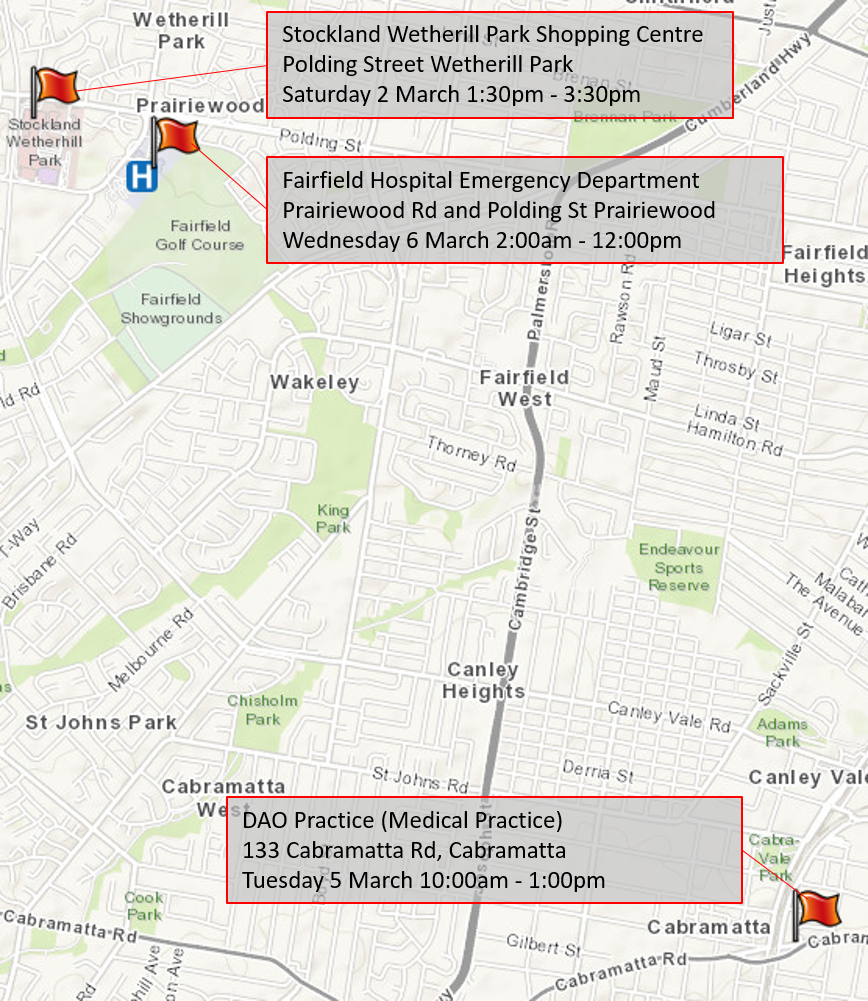This alert is no longer current
An alert has been issued advising people who visited a medical practice in Cabramatta, Fairfield Hospital Emergency Department, and the Stockland Shopping Centre at Wetherill Park to be alert for signs and symptoms of measles, after diagnosis of the illness in an infant who spent time in these locations while infectious.
The infant, who was too young to have received the measles vaccine as part of the routine schedule, acquired the infection while travelling in South East Asia. They developed symptoms shortly after returning to Sydney, and have been admitted to hospital.
People in the same locations at the same time as the infant (detailed in the map and table below) may be at risk of developing measles until 23 March if they are not already immune, as it can take up to 18 days for symptoms to present following contact with a person infectious with measles.
Measles is a serious, highly infectious viral illness which is spread through the air when an infectious person coughs, sneezes, or breathes. The measles virus can remain in the air for short periods of time, so simply being in the same room as a person with measles can result in infection if you are not immune.
Vaccination with two doses of measles containing vaccine provides the best protection against measles. The vaccine is safe and highly effective, with 99% of people who receive two doses developing lifelong immunity. In Australia two doses of vaccine are offered to children at 12 months of age (as measles-mumps-rubella (MMR) vaccine) and 18 months of age (as measles-mumps-rubella-varicella (MMRV) vaccine) under the National Immunisation Program. Anyone in NSW born during or after 1966 who does not have evidence of measles immunity, can access free MMR from general practitioners.
More information about measles can be found below or on Measles.
Cabramatta, Fairfield Hospital Emergency Department, and Stockland Wetherill Park Sunday 3 March - Wednesday 6 March 2019

Map created using Arc GIS Portal (Sources: Esri, HERE, Garmin, USGS, MET/NASA)
| Saturday 2 March 2019 |
Stockland Wetherill Park Shopping Centre, Polding Street Wetherill Park,
between 1:30pm and 3:00pm |
|---|
| Tuesday 5 March 2019 |
DAO Practice, 133 Cabramatta Rd, Cabramatta between 10:00am and 1:00pm |
|---|
| Wednesday 6 March 2019 |
Fairfield Hospital Emergency Department, Cnr Prairiewood Rd and Polding St Prairiewood, between 2:00am and 12:00pm |
|---|
These sites do not pose any ongoing risk to the public.
About measles
Measles generally begins with a fever, cough, runny nose and/or sore, red eyes, followed a few days later by a red, spotty, non-itchy rash which starts on the face and spreads to the body and limbs. People with measles may also experience diarrhoea, and this is more common in small children.
People who are experiencing signs and symptoms of measles should seek medical attention. NSW Health recommends calling ahead to the practice or emergency department to alert of them of your symptoms so that measures can be taken to limit your exposure to others upon your arrival.
Measles is a serious illness, and complications such as diarrhoea, middle ear infection and pneumonia occur in up to one third of cases. Measles encephalitis is swelling of the brain caused by the measles virus and occurs in up to one in 1000 cases. A fatal condition known as sub-acute sclerosing pan encephalitis, occurs in one in 10000 cases and is a progressive neurological disorder which presents years after measles infection.
People are at risk of measles if they are exposed to an infectious case, and have never had measles, or have not received two doses of measles containing vaccine. Two doses of measles containing vaccine provide lifelong protection against infection in 99 per cent of vaccinated people. Most people born before 1966 are assumed to be immune to measles.
NSW Health encourages all people 12 months of age or older, and born during or after 1966 make sure they have received two doses of measles vaccine. For people who are unsure of whether they have previously received two doses, it is safe to receive more than two.
Travellers are encouraged to discuss their travel plans with their GP to ensure that they are protected against preventable diseases such as measles prior to travel. People travelling with children between the ages of 9 months and 18 months of age should discuss travel plans with their doctor, as the vaccination schedule can be adjusted for children travelling to high risk areas for measles.
For more information download the  measles fact sheet, or visit Measles.
measles fact sheet, or visit Measles.